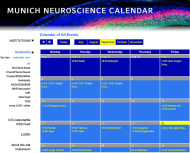Chronic back pain and the control over spinal nociception
GSN student Stefanie Krafft was awarded 1st place in the competition for the YoungScientistAward Pain 2016
21.10.2016
Chronic back pain and the control over spinal nociception
…over what? Let’s start with something more familiar: pain. By definition, pain is an unpleasant sensory and emotional experience, associated with actual or potential tissue damage. The development and processing of pain happens in the brain. Nociception on the other hand is the neural process of encoding noxious stimuli.
Pain is vital for us to survive. However, nature is smart and our nervous system owns a descending pain inhibition to limit pain. Descending pain inhibition is a powerful endogenous pain control system that originates in the brainstem and descends to the dorsal horn of the spinal cord. There, it inhibits spinal nociception by releasing serotonin and noradrenalin and hence reduces nociceptive input to the brain, which in turn leads to reduced pain sensation. Cognitive and emotional processes modulate the activity of descending pain inhibition, and thus also pain sensation. Chronic pain patients exhibit an impaired descending pain inhibition, which might be one reason for the persistence of pain. Improving descending pain inhibition in chronic pain patients is therefore a promising target for pain therapy.
As part of her study, GSN PhD student Stefanie Krafft tested if chronic back pain patients can improve their descending pain inhibition and with this reduce their chronic pain. Stefanie and her pain research group in the Department of Neurology of the University Hospital Großhadern (LMU), under supervision of PD Dr. Ruth Ruscheweyh and Prof. Andreas Straube, had previously developed a feedback training in which healthy subjects learned control over their descending pain inhibition, by using cognitive-emotional strategies and receiving feedback about their nociceptive withdrawal reflex (RIII reflex), a measure of spinal nociception.
 Stefanie's award winning research was conducted at the Hospital of Traunstein, in the Department of Anesthesiology, Intensive Care and Pain Therapy. The RIII reflex feedback training was used for the first time on chronic back pain patients, investigating its impact on pain therapy.
Stefanie's award winning research was conducted at the Hospital of Traunstein, in the Department of Anesthesiology, Intensive Care and Pain Therapy. The RIII reflex feedback training was used for the first time on chronic back pain patients, investigating its impact on pain therapy.
The prize was awarded to Stefanie this October at the Deutscher Schmerzkongress (German Pain Congress) in Mannheim. (© m:con)
The Young Scientists Award Pain is addressed explicitly to young scientists in German research institutions who deal with the subject of pain in patient-related research. Innovative works are being awarded, based on their contribution to the treatment of chronic pain. The prize is awarded annually by the German Pain Society in cooperation with Janssen-Cilag GmbH.
Congratulations to Stefanie!





